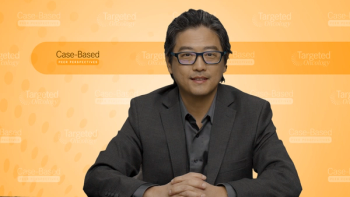
Navigating Disparities in Cancer Clinical Trials
In an interview with Targeted Oncology, Joshua Richter, MD, discusses how community oncologists can help manage disparities in diversity in clinical trials.
In an interview with Targeted OncologyTM, Joshua Richter, MD, associate professor of medicine, division of hematology and medical oncology at the Tisch Cancer Institute, and director of multiple myeloma at the Blavatnik Family-Chelsea Medical Center at Mt. Sinai, discusses a study he wrote along with Stephen Noga, MD, PhD, and Robert Rifkin, MD, published in the Journal of the National Comprehensive Cancer Network.
The study, "Ensuring Diversity and Inclusion in Clinical Development by Leveraging Community Oncology Centers," explores the lack of diversity in clinical trials and how community oncologists can help overcome these disparities.
Transcription:
0:09 | So I think one of the things that has become an increasing focus from the FDA, other regulatory agencies, and the research community in general, is that there has been biases throughout the years in clinical research. And the reality is that this is not simply a theoretical social construct. These biases have major implications. There could be different efficacy of therapeutics and different toxicity with people of different ages, different sexes, different races, different backgrounds. You know, as kind of a weird example, there's an old school chemotherapy called bendamustine, which German people tolerate in a lot higher doses than Americans. Now, I'm not going to go on record saying it's all beer and sauerkraut and that's what causes it. But there are differences. These are important differences of how we apply these drugs to our patient populations.
1:11 | And I think what has become evident is that there needs to be an emphasis on this. This can't just be an afterthought. We need to actively participate in ensuring that when we enroll patients into clinical trials, it's as broad as possible to get as much information on how to optimize it for an individual.
This is where this was kind of the focus of the paper in general, and the focus of this study is that you tend to have a skewing of a type of person who goes to an academic medical center, because of geographic reasons. You know, they're not located in every town, so many people have to spend a significant amount of time and money and have to have that time and money to be able to get there. The community oncologist may often see patients that don't have the economic flexibility to travel to a medical center or an academic medical center. They may see patients that are sicker and that may not be able to make that journey. They may only be able to go 5 or 10 miles down the road and not travel hours.
2:17 | So because our community counterparts see such a diverse group of patients, this is our opportunity to engage with them, and to do clinical trials together. And they're, you know, there are going to be certain early-stage therapeutics that require a lot of resources and things that may not be available to your average community oncologist. But there can be an interplay that can be a collaboration, to either provide that type of therapy, where patients go back and forth between academic and community, or once we have a general understanding of some of the basics, try to port as much of this as possible to our community colleagues.

















